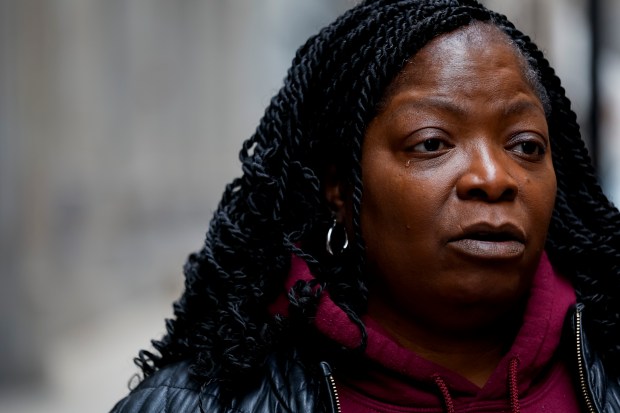Mayor Brandon Johnson indicated Tuesday he is moving ahead with a stalled ordinance to overhaul guidelines on Chicago police raids but hedged on whether his latest plan would preserve a key ban on no-knock warrants that he campaigned for two years ago.
Johnson confirmed in a City Hall news conference that his administration was working on an updated draft of the so-called Anjanette Young ordinance, named after the Black woman who took on the city following a wrongful police raid that made national headlines in 2020 after video showed Chicago cops leaving Young, a social worker, handcuffed and naked in her home during the search.
But the mayor repeatedly dodged questions about whether his latest effort would include a major tenet from the original draft — a ban on no-knock warrants — that was the animating force behind Young’s demands for reform.
“Our comprehensive response to this tragedy in the city encompasses the voice of the individual who experienced this tragedy, along with our police superintendent and alders,” Johnson said. “There is a draft, and there are ongoing conversations to figure out how we can have an ordinance that works for everyone and that we can put residents at ease, that they won’t be subject to those type of interactions with law enforcement.”
Young declined to comment on Tuesday, but WBEZ reported last week that the Johnson administration discussed with her a new draft of her namesake ordinance that leaves out a no-knock warrant ban.
Ald. Maria Hadden, 49th, chief sponsor of the ordinance, declined to comment Tuesday.
The mayor’s team last week began updating select aldermen on his upcoming City Council agenda, which includes a new version of the Anjanette Young ordinance that would mandate regular reporting on search warrants, public release of materials related to certain raids, “agreements related to training” and unspecified changes to “process” and “service of warrants,” according to a copy of the briefing materials obtained by the Tribune. But the presentation made no explicit mention of a no-knock warrant ban.
Ald. Chris Taliaferro, 29th, said the mayor called him Monday to inform him that a revised version of the Anjanette Young ordinance would indeed be coming through the council’s Police and Fire Committee that Taliaferro chairs. Their conversation followed recent calls the alderman said he took from Johnson’s intergovernmental affairs staff and from Hadden on a new draft.
Taliaferro, a former Chicago police officer, told the Tribune he “would not be supportive of codifying police procedure,” including a no-knock warrant ban.
The full version of the revised ordinance has not yet been made publicly available or introduced in the City Council.
Johnson’s 2023 mayoral bid included a public safety plan that promised: “Enact Anjanette Young ordinance to end no-knock warrants.” Young also endorsed his candidacy ahead of the Feb. 28 election, throwing weight to the progressive challenger’s messaging on racial justice and police accountability after her namesake legislation stalled under then-incumbent Mayor Lori Lightfoot.
On Feb. 21, 2019, Chicago police botched a search warrant execution and went to the wrong home, restraining Young, instead of an unrelated male suspect, as she was getting ready for bed. Officers did not allow her to put clothes on and handcuffed her during their search.
Her story became a national controversy in December 2020, partly because Lightfoot officials sought an order to prevent CBS 2 from airing disturbing footage from the raid and requested sanctions against Young for sharing footage with the media. Lightfoot’s lawyers later said they only wanted sanctions against Young’s attorney but dropped the request altogether as the scandal spiraled.
No-knock warrants allow officers to forcibly enter homes without announcing themselves, notably in the 2020 police shooting of Breonna Taylor, a Black woman killed in Louisville, Kentucky, during a flawed drug investigation. The Anjanette Young ordinance originally would have banned no-knock warrants except in cases of “exigent circumstances,” such as someone facing imminent physical harm.
In 2022, Hadden attempted to push the legislation in a City Council committee but that effort failed in a 10-4 vote. That was after a previous version in 2021 also failed to garner a floor vote as Lightfoot argued such reforms should be reflected within Chicago Police Department directives, not codified in law.
Under Lightfoot, the CPD did make changes to its warrant policy in May 2021, and Hadden has acknowledged those reforms touched on many of the Anjanette Young ordinance’s proposed changes. The changes included requiring a department member at the rank of lieutenant or above to be at the scene when the warrant is executed, and for each member of the team serving the warrant to wear body cameras.
A female member of the department also is required to be present while the warrant is being served, according to the internal directives. In addition, the more unusual “John Doe” and no-knock warrants must be authorized by bureau chiefs. John Doe warrants are based on anonymous, but verified, tips.
Hadden and Young have said those changes and more need to be permanently codified. In the absence of City Council movement, the two have suggested the ongoing federal consent decree as another possible avenue to cement the reforms. But the federal judge overseeing the binding CPD reform order declined to ban no-knock warrants in a ruling later that May.
In December 2021, aldermen approved a $2.9 million settlement for Young. But her crusade to reform CPD’s search warrant policy has continued, with hints of impatience bubbling over during a February 2024 news conference when she said: “I endorsed the new administration, and I campaigned for them. And my statement to them is, let’s get at the table and make this happen.”




